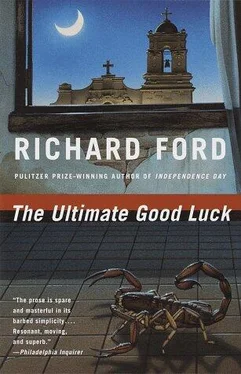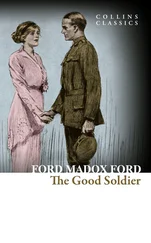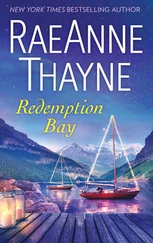
The airport terminal was cheap tinted glass and concrete, and enclosed too little space. It gave you the feeling of having been half built, then abandoned, so that one end had needed to be blocked off.
Rae stood in the middle of the lobby, watching the soldiers. The other passengers had maneuvered themselves close to the baggage gate and were keeping their eyes on their business. The soldiers were holdovers from the interception, and were left around as cautions for new arrivals. They were combat-readies, and had done some shooting and looked serene.
“Does the army meet all the flights?” Rae said. The soldiers had begun leering at her.
“They think you’re hot stuff,” Quinn said, keeping his eye on the steel baggage doors. “Forty of them would be happy to show you a good time.”
She took his arm and hugged it, ignoring him. She had on a green leotard, black jeans, and tinted glasses. She looked like a low-budget tourist. “Are you still protecting the deer, Harry?” She smiled at him.
“I gave it up,” he said.
“You still let the marines cut your hair, though, don’t you?” She intended to be friendly now.
“I wanted you to recognize me,” he said.
“I’d always know you, Harry,” she said and looked back at the soldiers, holding his arm tighter. “Big smile. Ecstasy on your face.”
“Where’ve you got the money?” he said.
She pulled a strand of red hair away from her cheek. “In my Varig bag. I didn’t think to tape it to my thighs.”
A lot of money meant dope, and he wanted it brought in inconspicuous. No one checked luggage coming in. Coming in was easy. Getting out was the bitch.
He kept watching the gate. “My father died,” Rae said matter-of-factly.
“Did he know about this?” Quinn said.
She had stared at the soldiers a long time. “He thought it was droll. He thought the maladroit ought to be punished.” She looked up at him and smiled. “I’m a little stoned,” she said, “but I’m glad you quit wardening. It didn’t really suit you.”
Soldiers could smell dope in a shit house, and no one could stop them if they decided to search you, like the college girls out on the highway. It wasn’t smart. But she was freaked. “Are you holding?” he said, and took a look at the soldiers lining the exits.
She kept smiling. “I smoked a number on the plane,” she said. “My last. I’m quitting in your honor. It just didn’t seem right. Why don’t you tell me how Sonny is?”
He didn’t want to think about Sonny now. Sonny seemed a long way away. “He’s alive,” he said.
“What’s that mean?”
“It means he’s in el slammer. It’s not a hotel.”
“Is he getting out?” she asked calmly and looked at him. Her eyes were afraid.
“That’s why I’m here,” he said.
“I see,” she said and looked away.
Taxi drivers had begun combing the passengers for fares back to town. “Downtown” was all they could say, and it was making the passengers nervous. Anxiety was your usual accompaniment. You flowed down it or you flowed against it, but you didn’t float out of it. It was like the war, and you acclimated the same way, by never being out of it long enough to expect anything better. He felt like he’d made a good adjustment.
A jeep growled behind the accordion gate, and the steel doors suddenly banged up and the crowd moved in. Two fat Mexican boys began hurling bags through the opening. Across the plain of the Atoyac, the wrecked Pepsi truck was clearly visible in the distance. A long blanket of grey smoke had been persuaded back toward the city on the breeze that trailed the rain. Police flashers were swirling on the road.
“What’s that?” Rae said curiously. She stepped forward and started out through the open gate toward the truck. She took his arm and kept him from moving up into the crowd for the Varig bag.
“I don’t see anything,” he said.
“Sure you do,” she said and smiled. “That’s exactly what you see. Nothing’s innocent to you.”
“I’m trying to lose that knack,” he said. “It’s in your honor.”
She gripped his arm tighter. The soldiers were pointing out toward the smoke. “It’s out of your control,” she said, staring transfixed. “It’s your instinct.”
The other passengers were yelling in a confused English-Spanish and pushing bags back through the crowd. The taxi drivers had formed a line preventing anyone from getting to the exits. They stood holding white cards that said TAXI, and were smiling. The Pepsi truck exploded suddenly, a dark smoke puff followed by a bright orange swell. The noise took a second to arrive, and arrived diminished. “What’s the matter with this place?” Rae said.
“It’s full of Mexicans,” he said, easing her into the crowd toward the gate. “Don’t let it bother you.”
“I don’t like it,” she said. “I’m sorry I made you bankroll this. I didn’t know what else to do.” She glanced at the soldiers uncertainly. “I don’t know why I thought I had to do this.”
“Because you love me,” Quinn said, and put his arm around her.
“I guess that’s it,” she said. Her mouth was constricted. A short, fat Texas woman began giving her a deferential look. Rae pulled loose and let herself be pushed back through the pressing crowd, while Quinn moved toward the money.

Where the Pepsi truck was burning there were a lot of police. Three blue minibuses blocked one lane with flashers popping, and several plainclothesmen with machine guns were marshaling cars onto the muddy shoulder. Stray officers were stopping vehicles and making drivers show papers. There was no reason for it, but there was nothing else for them to do. The driver was lying on his side on the pavement away from his truck, his face frozen and messed with blood. Some of the police were guarding him as if they thought he might be of some use later on. One of them was taking the driver’s picture with a Polaroid. Quinn had his tourist card out, but when he passed by the policeman directing traffic, the policeman called “quickly, quickly,” and waved him on.
“What’s that about?” Rae said. She had the blue Varig bag on the seat under her arm. He had made her count the money in the parking lot, where he could see it. She turned and looked back at the Pepsi truck.
“An accident.” He kept his eyes on the road.
“The man was dead there,” she said. “His eyes were open.” She didn’t seem surprised. He glanced in the rearview. Some of the police had started drinking Pepsis. “All I’ve seen now are soldiers and police and dead people,” Rae said. “Do you like it here?” She wasn’t going to make an issue of the driver. It was a gift.
“It wasn’t my first choice,” he said.
She turned back and faced front. “Where’m I staying?”
“In the Centro. I’ve got you a room.” It was a lie that didn’t matter.
“Where are you?” she said, precisely.
He pointed up the Reforma Hill above the brown low profile of town. The white soffits of the bungalows shone above the palms of the nicer district nearer down the hill. Where the rain had cleaned the air, the bungalows seemed not far away. Behind them the rain glowered in the hills. A trace of the truck’s smoke had begun stringing out into the green atmosphere. “Straight up,” he said.
She took off her glasses, closed her eyes, then opened them widely at the mountains. “Is it pricey?”
“Nothing’s pricey,” he said.
“Then I’ll stay there,” she said.
“That might be weird,” he said. He wanted her to stay as hard as he could imagine wanting, but he didn’t want it taken for granted, and he didn’t want her left there if Deats showed.
Читать дальше








![Theresa Cheung - The Dream Dictionary from A to Z [Revised edition] - The Ultimate A–Z to Interpret the Secrets of Your Dreams](/books/692092/theresa-cheung-the-dream-dictionary-from-a-to-z-r-thumb.webp)




